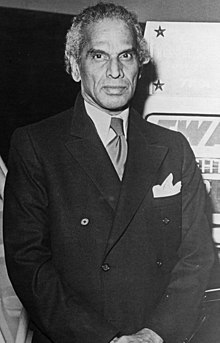
Back فينجاليل كريشنا مينون Arabic فينجاليل كريشنا مينون ARZ V. K. Krishna Menon German V. K. Krishna Menon Esperanto Krishna Menon Spanish V. K. Krishna Menon Finnish V. K. Krishna Menon French V. K. Krishna Menon Irish ונגליל קרישנן קרישנה מנון HE वी के कृष्ण मेनन Hindi
V. K. Krishna Menon | |
|---|---|
 Menon, c. 1950s | |
| Union Minister for Defence | |
| In office 17 April 1957 – 31 October 1962 | |
| Prime Minister | Jawaharlal Nehru |
| Preceded by | Kailash Nath Katju |
| Succeeded by | Yashwantrao Chavan |
| Permanent Representative of India to the United Nations | |
| In office 1952–1962 | |
| President | Rajendra Prasad Sarvepalli Radhakrishnan |
| Prime Minister | Jawaharlal Nehru |
| Member of Parliament, Lok Sabha | |
| In office 1957–1967 | |
| Preceded by | Vithal Balkrishna Gandhi |
| Succeeded by | Constituency Abolished |
| Constituency | Mumbai North |
| In office 1969–1974 | |
| Preceded by | Sachindra Nath Maity |
| Succeeded by | M. N. Govindan Nair |
| Constituency | Midnapore (1969–71) Trivandrum (1971—74) |
| Member of Parliament, Rajya Sabha | |
| In office 1953–1957 | |
| Constituency | Madras State (1953–56) Kerala (1956—57) |
| Indian High Commissioner to the United Kingdom | |
| In office 1947–1952 | |
| Prime Minister | Jawaharlal Nehru |
| Preceded by | Position established |
| Succeeded by | B. G. Kher |
| Personal details | |
| Born | Vengalil Krishnan Krishna Menon 3 May 1896 Thalassery, Kannur district, Madras Presidency, British India (now in Kerala) |
| Died | 6 October 1974 (aged 78) Delhi, India |
| Political party | Indian National Congress |
| Other political affiliations | India League and the Indian Independence Movement |
| Parent(s) | Komath Krishna Kurup (father) Lakshmi Kutty Amma (mother) |
| Alma mater | Presidency College (BA) Madras Law College London School of Economics (BSc, MSc) University College London (MA) Middle Temple (Barrister-at-Law) |
| Awards | See awards section |
| Source | Parliament of India |
Vengalil Krishnan Krishna Menon (3 May 1896 – 6 October 1974) was an Indian academic, independence activist, politician, lawyer, and statesman.[1][2] During his time, Menon contributed to the Indian independence movement and India's foreign relations. He was among the major architects of Indian foreign policy, and acted as Jawaharlal Nehru's diplomat.
In 1928, Menon founded the India League in London to demand total independence from the British rule in the Indian subcontinent. Towards the end of the 1940s, he presided Indo-British matters and caused the selection of the last British Viceroy of India, Louis Mountbatten.[3] He worked with Nehru, Mountbatten, Sardar Patel, and V.P. Menon to work out the mechanics of Indian independence.
After the independence of India, he facilitated international diplomacy and resolutions in situations such as the Suez Crisis, Korean War, invasion of Hungary, Cyprus, Indochina, Taiwan, and the Chinese capture of American airmen, while supporting the anti-colonial ethos of what he would eventually name the Non-Aligned Movement.[4][5] Since the independence of India, he served as High Commissioner to the United Kingdom, Ambassador to the United Nations, and Defence minister. As a Defence minister, he played a role in military conflicts such as Congo Crisis, Annexation of Goa, and Sino-Indian War.[6] During his tenure as defence minister, India saw establishment of domestic military-industrial complex and educational systems, the Sainik Schools, the Defence Research and Development Organization (DRDO), and other defence and military institutions, while professionalizing the National Cadet Corps and similar entities.[7]
He was elected to both houses of the Indian parliament from constituencies such as Mumbai, Bengal, and Trivandrum in his native state of Kerala. He remained a member of the Lok Sabha until his death.
- ^ "The 1962 Election in North Bombay" (PDF). Archived from the original (PDF) on 18 March 2012.
- ^ Fuller, C. J. (30 December 1976). The Nayars today – Christopher John Fuller – Google Books. Cambridge University Press. ISBN 9780521290913. Retrieved 11 July 2012.
- ^ Ramesh, J. (2019). Chequered Brilliance. India: Penguin Books India PVT, Limited.
- ^ "Why ditch the non-aligned movement?". Business Line. 16 September 2016.
- ^ "V.K. Krishna Menon, the 'evil genius' behind the non-aligned movement". The Print. 6 October 2018.
- ^ United States. Department of State (1994). Congo Crisis. Department of State publication. U.S. Government Printing Office. p. 739. ISBN 978-0-16-041905-8.
- ^ Krishna Rao, K. V. (1 March 1991). Prepare or perish: a study of ... – K. V. Krishna Rao – Google Books. Lancer Publishers. ISBN 9788172120016. Retrieved 11 July 2012.